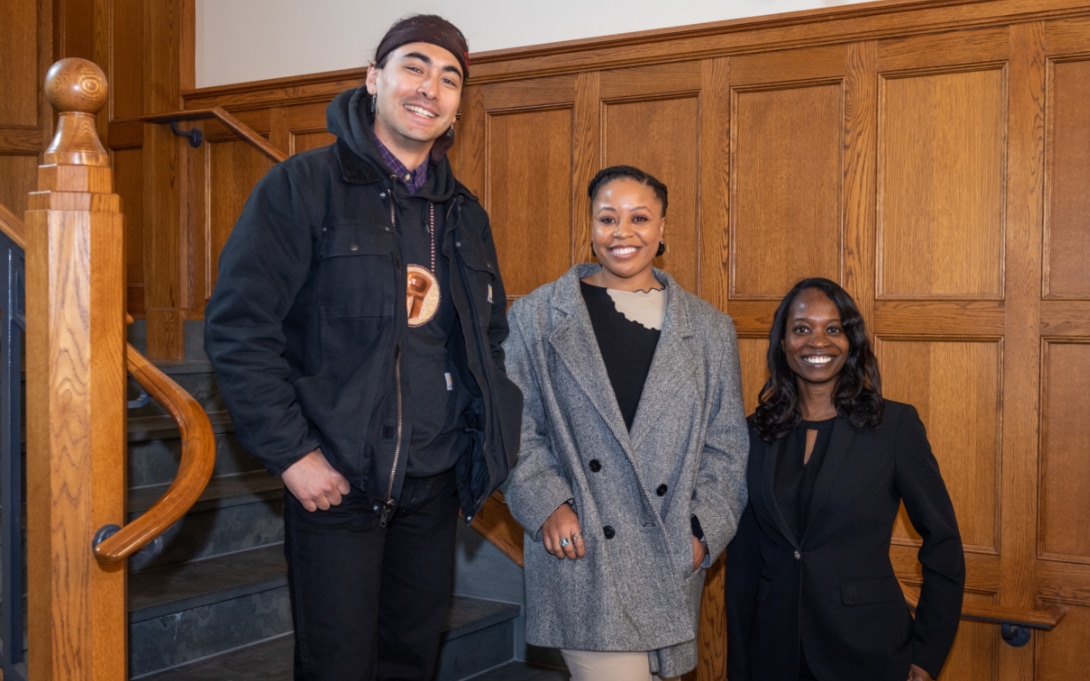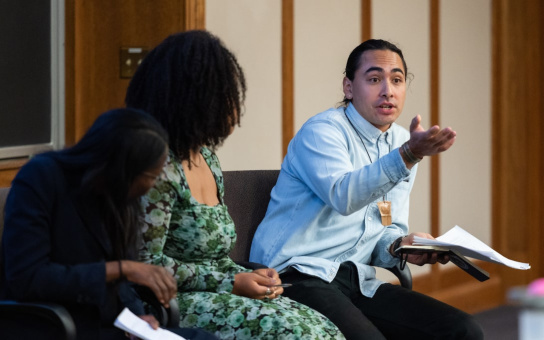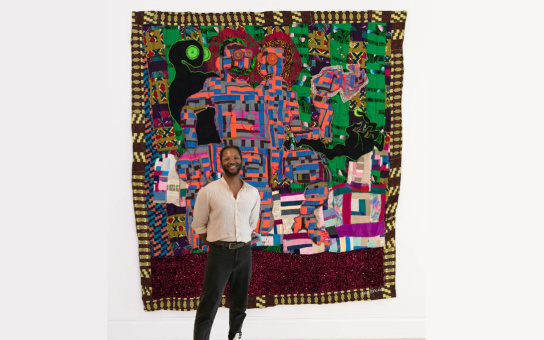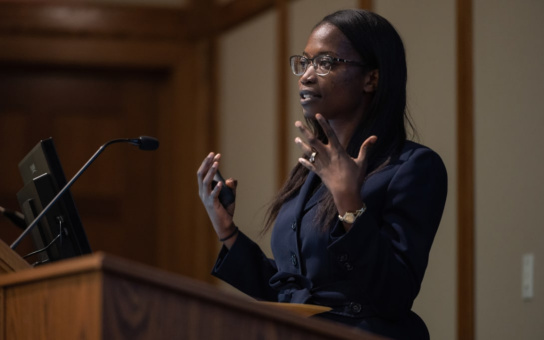
Three inaugural Center for Racial Justice visiting fellows—Julian Brave NoiseCat, Makeda Easter, and Atinuke (Tinu) O. Adediran—reflect on the work they've pursued during their year at the Ford School.
By Lillian Chen and Rebecca Cohen (MPP '09)
The "beautiful, painful, and good" life
Julian Brave NoiseCat is a writer, filmmaker, journalist, and member of the Canim Lake Band Tsq'escen and a descendant of the Lil'Wat Nation of Mount Currie. He has written for numerous publications, including The New York Times, The Washington Post, and The New Yorker.
Uncovered family history
NoiseCat continues work on his first book, We Survived the Night, which aims to "change and reclaim the narrative about the often marginalized and forgotten First Peoples in the United States and Canada." NoiseCat describes his book, which is divided into three thematic sections—apocalypse, odyssey, and trickster—as an amalgamation of historical, personal, journalistic, mythical, and nonfiction storytelling.
NoiseCat is also working on a documentary film that follows the May 2021 search for and excavation of unmarked graves at St. Joseph's Mission School in Williams Lake, British Columbia. He says the making of the documentary—and uncovering truths about his family's dark connections with the school—is one of the most intense creative experiences he's ever had.

Sparking change
The beautiful thing about non-fiction storytelling, NoiseCat says, is that it shows "how one chooses to view the world and move through it." He aims to show the expanse of Indian country to readers who may not know it exists—and prompt greater recognition of the "beautiful and good" Indigenous life. NoiseCat hopes his projects empower other Native people "to learn and live their own stories in a way that honors their ancestors and gives to their descendants."
Coming soon: NoiseCat and his film team are aiming to premiere their documentary in early 2024. He will complete and publish his book not long after.
The art rebellion
Makeda Easter is an award-winning arts and culture journalist and a Knight-Wallace Fellow. Her work has appeared in the Los Angeles Times, Dance Magazine, Chemical & Engineering News, American Theatre, and more.
The art rebellion
Protests in the wake of George Floyd's murder pushed Easter to shine a light on underreported artists who help shape social movements. Her catalyst project, "The Art Rebellion," is an independent digital publication focused on artists-activists in funding-starved communities.
Memorable interviews
Easter's first interview was with Doris A. Fields (aka Lady D), a singer, songwriter, actor, and writer amplifying the stories of Black Appalachians.
Since then, Easter has interviewed Rachel Wallis, an Ohio-based abolitionist quilter who leads art programs in women's prisons and whose creativity is guided by racial justice.

Another quilter, Basil Kincaid from St. Louis, showed Easter how artists get by without institutional support. Living in a studio space for $250/month, Kincaid sold prints on Facebook and in barber shops, organized street performances, installed quilts in vacant lots and storefronts, and used Instagram to connect with Black art collectors.
Sparking change
From her wide-ranging interviews—the founder of a DIY museum arts cooperative, a carillon documentary composer, and more—Easter's opinion of who "counts" as an artist has evolved.
So have her goals. At Michigan, she found fresh inspiration by visiting galleries and speaking with professors, journalists, and policymakers. Easter now hopes to reach new political audiences and convince decision-makers to increase funding to the arts.
Coming soon: Easter's new "Artist-Pay Project" will gather and share anonymous artist surveys to explore the financial hardships that artists face and shine a light on pay equity. She hopes this research will inform public policy at the intersection of arts, culture, politics, and economics.
Race in corporate America
Atinuke (Tinu) O. Adediran is a leading scholar on the intersection of race, business, and law. Adediran is an associate professor of law at Fordham University School of Law. Her fellowship is supported in part by the Goldman Sachs One Million Black Women Initiative.

Her catalyst
When Adediran presented her prior work on diversity, equity, and inclusion (DEI) in business to her colleagues, she says that some of them pointed out that the issues she brought up were really about race rather than DEI broadly. "There is very little research about how corporations talk about race. This is where my heart is."
She came up with the idea for her book in the aftermath of the racial reckoning of 2020 as companies became more publicly facing about race. Adediran analyzes how and why companies have changed the prevalence and use of the language of race in their public statements.
Sparking change
Adediran hopes that her book will help academics, shareholders, employees, other stakeholders, and policymakers to better understand how race in corporate America has changed since the racial reckoning and to regulate the promises businesses make. "Pledges shape public image, but businesses are not held accountable," she says.
Coming soon: A U.S. Supreme Court decision about the legal defensibility of corporate pledges is expected in June 2023. Adediran's book will be published in 2025.
More in State & Hill
Below, find the full, formatted spring 2023 edition of State & Hill. Click here to return to the spring 2023 S&H homepage.
